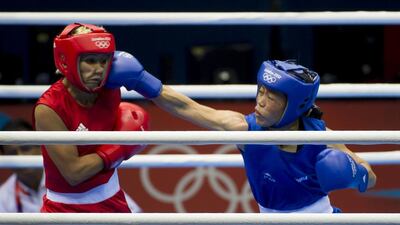For a nation unaccustomed to Olympic success, with Abhinav Bindra in the Men’s 10m Air Rifle at Beijing 2008 the only individual gold medallist, boxing offered more than a few glimmers of hope.
In 2008, Jitender Kumar (flyweight) and Akhil Kumar (bantamweight) reached the quarter-finals, while Vijender Singh (middleweight) went a step further and won bronze.
In London four years later, Vijender lost in the quarter-finals, as did Devendro Singh in the light-flyweight division. Three others reached the round of 16, with Vikas Krishan Yadav, a welterweight, losing on appeal to Errol Spence, who now boasts a 20-0 record in the professional ranks.
What the men could not do, the lone woman did, with MC Mary Kom winning bronze in the women’s flyweight class.
Many of the male boxers hailed from Haryana, with the Bhiwani Boxing Club — where Vijender and Akhil learnt the ropes — earning Little Cuba comparisons. That was then. What was happened since is a sadly predictable story in a country where most sports remain at the mercy of clueless politicians and career opportunists.
In December 2012, the Indian Olympic Association (IOA) itself was suspended. The boxing body succumbed to infighting. Neither side was ready to back down, and the sport has been going around in circles ever since.
In London, seven men and Mary Kom had been part of the boxing contingent. Thus far, only Shiva Thapa, who lost in the first round of the bantamweight event four years ago, has managed to qualify for the Rio de Janeiro Olympics.
There is still no Indian boxing federation. The International Boxing Association (AIBA) had set a deadline of May 14 for that to happen, but that has now been extended. If that hadn’t happened, Thapa and any other Indian qualifiers would have had to fight under the AIBA flag rather than the Indian one.
A ruling body, likely to be called the Boxing Federation of India, will be cobbled together, with elections scheduled for late May. One qualifying event remains for both men and women, but it’s highly unlikely that we’ll see the kind of representation that there was in London or Beijing.
"The government of India has tried their best to help the boxers, but mentally the boxers are not in the right frame of mind," Rajkumar Sangwan, a two-time Asian Games gold medallist, told The Times of India. "With no federation in place, there is lack of support and if you look the current crop of Indian boxers, we have the same old names who were there at the top four years back.
“Youngsters have not come through, we have not been able to prepare the next generation of boxers with no national competitions and other events happening.”
The events of the past three years should also serve as an eye-opener for those that have been crying hoarse about the need for cricket, the country’s most popular sport, to come under government control. For all its flaws and excesses, the Board of Control for Cricket in India (BCCI) knows how to run its turf and send out a team capable of holding its own in the international arena.
Every other sport is an unprofessional joke, held back by those with no relevant background or ability. If anything, boxing and other sports need to learn from the BCCI about how to limit the damage from political interference.
India’s boxers have the talent to spring a surprise or two in Rio, but if they do, it will be in spite of the enemies within, the administrators who do everything but what they are supposed to.
Follow us on Twitter @NatSportUAE
Like us on Facebook at facebook.com/TheNationalSport

